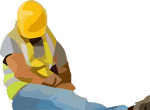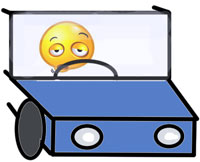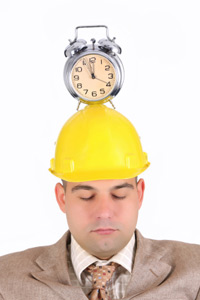Shift Work and Health Issues
Discover the danger of shift work

Do you find difficult to adapt to a day-night shift work? Can your health be affected from working in shifts?
As you'll discover in this article, studies demonstrated that shift work involves inherent dangers from fatigue, impaired judgment, slow reaction time, and a listing of other physical problems because of sleep deprivation.
It took me a 6 years to realize how bad my health was a affected from working in shifts. All my colleagues were complaining about the same symptoms, so I thought it may be normal to be tired, weak and depressed.
I found how much damage can shift work do to your body when I started to educate myself about my sleeping problems. I discovered that my symptoms were related to different types of sleep disorders, including sleep apnea, that made me wondering if it's worth it to continue to work in shifts.
I was not expecting that sleep apnea and night shifts to have a certain connection. But the more I learned about it, the more I started to think that my shift job was not for me.
What's the problem of working in shifts?

Work shift is a term that applies to a nonstandard work schedule, including night shifts, rotating shifts and other random work schedules.
But what is the problem in working in shifts?
Think about sleep deprivation and working instead of sleeping. Can you work 12 hours, from six o'clock in the evening until six o'clock in the next morning? How about working with this schedule every night?
Do you think it's easy for your body to support the disturbance of the biological clock without consequences ?
A study from Department of Environmental and Occupational Health proved that night work and rotating shift work disrupt the circadian timing system.
This disruption can cause harmful symptoms in some workers, and these people are at increased risk to experience serious health issues like cardiovascular, gastrointestinal, and reproductive problems.
The side effects of night shift job on health
Shift Work Sleep Disorder
Sleep disturbance and sleepiness are normal physiological responses to alternative work schedules.
However, it is estimated that up to third of all shift workers suffer symptoms significant enough to meet the criteria for shifts work sleep disorder.
Insomnia & Excessive Sleepiness

It's difficult to imagine that a person who works in night shifts has insomnia. You'll think that if you work during the night, it will be easy to fall asleep when you return from work in the morning?
Well, many shift workers can't fall asleep or get rest when they try to sleep during the day. I was one of them. And it's a horrible feeling. Especially when you have to work the next night.
However, in general, shift workers have excessive sleepiness problems. This is the most common symptom that you'll hear when they complain about sleep.
Increased accidents at work
It is clear that the risk of accidents at work is increased during the night.
- Many of the world's most serious disasters, such as Chernobyl, Three Mile Island or Union Carbide chemical plant in Bhopal, India, are partially attributed to fatigue and night work-related performance failures.
Reduced alertness and Impaired mental performance
You will understand how affected is your mental performance and alertness mostly after you take a long holiday and sleep all the nights, like a normal person. For me, the transformation was so eye-opening that I started to think about quitting my job.
Sleepiness-related car accidents

People that work during the night shouldn't drive. But in real life, this rule is broken by many shift workers. Probably because they have no choice, or they think they are alert enough to drive.
Unfortunately, bad things can happen when you fall asleep for just a millisecond. Here are some videos that demonstrate the danger of driving when you are too tired.
Health Problems from Night Shift Work

In general, shift workers are at greater risk of gastrointestinal, cardiovascular and reproductive disturbance, and... cancer.
Yep, it's hard to believe, but a clinical study from Center for sleep medicine, Nürnberg, Germany demonstrated that female shift workers can develop breast cancer.
The cancer is triggered by the disruption of the sleep-wake rhythm, insomnia and a lack of melatonin, disruptions that are so common in shift workers.
Men can develop cancers by additional contributing factors such as:
- psychosocial stress of work in shifts
- the type of food and the timing of eating - Eating meal during shift hours could result in abnormally timed pancreatic responses, which might increase the risk of diabetes and heart disease.
- desynchronization between the work schedule and the worker's circadian rhythms - In other word, when your body clock is disrupted by different activities instead of sleeping, it may appear a mutation of clock genes with an increased tumor development and cancer.
Bottom line...
Reduced quantity and quality of sleep negatively affects the activities your life as a shift worker, especially in your social activities, quality of life and health.
My type of work was the graveyard shifts work, or all night work schedule. This schedule results in the greatest sleep loss, which arises from a desynchronization between the work schedule and the my body's clock.
I couldn't sleep anymore at home, and I couldn't work anymore at my job. I was thinking about taking melatonin pills, but then I changed my mind when I learned about melatonin side effects.
My body clock was broken and I felt very tired every day. And when I found that I have a moderate sleep apnea, I decided to quit my job. I was motivated to research about this new sleep breathing disorder that I have, and I wanted to know if my shift schedule caused my apnea episodes.
For more info about sleep apnea in shift workers, see sleep apnea and shift work.
Furher Reading
| Epworth Sleepiness Scale - Test your sleepiness |
| Why do you have Excessive Sleepiness? |
| Sleep Disorders Centers |







